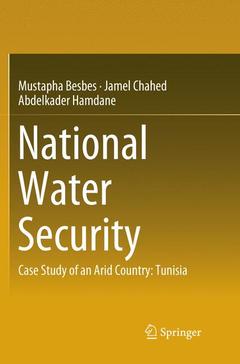Description
National Water Security, 1st ed. 2019
Case Study of an Arid Country: Tunisia
Authors: Besbes Mustapha, Chahed Jamel, Hamdane Abdelkader
Language: English
Approximative price 147.69 €
In Print (Delivery period: 15 days).
Add to cartPublication date: 01-2019
Support: Print on demand
Approximative price 105.49 €
In Print (Delivery period: 15 days).
Add to cartPublication date: 06-2018
Support: Print on demand
Description
/li>Contents
/li>Biography
/li>Comment
/li>
This book shows how the change of water paradigm has become urgent, and provides evidence for new policies that expand water balance to green and virtual water. The issue of water security concerns drinking water supply but also food safety, linked to agricultural policy. Both rain-fed and irrigated agriculture play complementary roles in food security, and the water issue implies a holistic view of water resources. This view constitutes the book's backstory. The reader will find original ideas that can be applied everywhere because the example of Tunisia is typically a basis to illustrate a universally prevalent situation. The book deals with other important issues: desalination, wastewater recycling, water quality, groundwater overdraft, water savings, governance, knowledge valuing, education, information: upgrading the whole water systems for the future implies emancipation of the whole society.
reface
Introduction
Chapter 1. The World Water Issues
1.1- THE GLOBAL WATER BALANCE
1.2- THE WATER BALANCE OF ARID COUNTRIES
1.3- Basic principles, key concepts and instruments
1.4- SCARCITY AND SHORTAGE: ISSUES AND CHALLENGES
1.5- WATER SECURITY, A PERMANENT INTERNATIONAL ISSUE
Chapter 2. Fifty years of water policies, 1960-2010
2.1- HYDRAULICS, A LONG TRADITION IN TUNISIA2.2- THE BROAD WATER POLICIES
2.3- THE MAIN LEVERAGES: PLANNING AND INVESTMENT
2.4- INSTITUTIONAL ORGANIZATION AND INTERSECTORAL COORDINATION
2.5- PRIORITY ISSUES AND RISK MANAGEMENT
Chapter 3. The National Water Balance
3.1 THE HYDROLOGICAL SETTING
3.2 THE STATE OF WATER RESOURCES3.3- THE WATER RESOURCES MOBILIZATION
3.4- THE STATUS OF WATER USES
3.5- WATER RESOURCES AND USES : THE REGIONAL IMBALANCES AND RANSFERS
3.6- THE AQUIFERS OVEREXPLOITATION
3.7- THE ANTHROPOGENIC WATER CYCLE AND THE WHOLE WATER BALANCE
Chapter 4. The holistic water balance: Blue Water, Green Water and Virtual Water
4.1- THE RAIN-FED AGRICULTURE GREEN WATER-EQUIVALENT
4.2- EVALUATION OF THE CROPS PRODUCTION WATER-EQUIVALENT
4.3- WATER BALANCE OF LIVESTOCK PRODUCTIONS
4.4- WATER BALANCE OF FOOD NEEDS
4.5- WATER SECURITY AND FOOD SECURITY
Chapter 5. Managing water demand and unconventional resources
5.1- THE DRINKING-WATER SECTOR
5.2- THE IRRIGATION SECTOR
5.3- REUSE OF TREATED WASTEWATER
5.4- WATER DESALINATION
Chapter 6. Water Security in Tunisia: debated issues
6.1- SECURING THE WATER SUPPLY
6.2- WATER SECURITY AND FOOD SECURITY: A PROSPECTIVE EXERCISE6.3- HOW TO ACHIEVE GOOD WATER GOVERNANCE?
EPILOGUE: THE FUTURE OF WATER and the LEARNING SOCIETY
Conclusion
References
Jamel Chahed is a hydraulics engineer and Doctor es sciences, Professor at the National Engineering School of Tunis, University of Tunis El Manar. His work focuses on transfers in industrial and environmental fluid systems, atmospheric dispersion, water governance and water management. His research has appeared as articles, books, book chapters, conference acts in specialized literature such as hydrology, water resources management, hydraulics, turbulence and transfers, environmental engineering. He actively contributed to the development of long-term vision for water security with a thematic focus on holistic water balance assessment. He has been involved in number of national and international academic research and technical programs. As visiting professor, associate researcher or guest speaker he joined number of international research teams at academic institutes, research laboratories and R&D centres.
Abdelkader Hamdane is graduated from Institut National Agronomique de Paris (1971), and Ecole Nationale du Génie Rural, des Eaux et Forêts de Paris (1973). He is general engineer, formerly General Director of the
Documents a precise pattern to assess the water security of a given country
Discusses the Tunisian water situation as a typical case for water future in other arid countries
Presents a first comprehensive vision of water resources on the scale of a nation
These books may interest you

Waters of BrazilStrategic Analysis 105.49 €

Waters of BrazilStrategic Analysis 105.49 €


